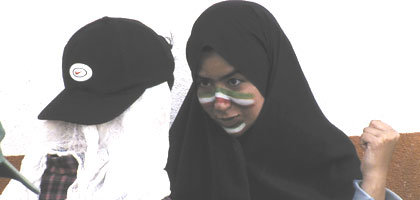
A nation of two halves
Film of the Month: Offside

The upbeat ending to his film about Iranian female football fans banned from the game has prompted accusations that Jafar Panahi has sold out. But Offside's comedy has a dark core, says Julian Graffy
Football, for the male characters in Offside, means solidarity: men of all ages are noisily off to the match. The fans include a blind man who prefers the atmosphere of the stadium, where he can curse and swear, to the decorous experience of tuning in at home. The shirts the supporters wear proclaim a broader allegiance: to the Brazilian forward Ronaldo and the Nigerian Kanu, to the international community of fans, and to the celebration of this unity in the World Cup finals in Germany, to which this match, a crucial qualifying game against Bahrain, can bring access. But this is a carnival from which women and girls are excluded, a fact viewers are apprised of in the film's opening scene, in which an old man hunts for his daughter, who is trying to get into the match disguised as a boy.
The fan in the Ronaldo shirt and his friends express solidarity with another young woman, a novice to concealment and live football, but their readiness to help is limited by self-interest (nothing must stop them from getting into the ground on time). It's the same with the tout who will sell the girl a ticket but at an inflated price and the soldiers who hold her and several other frustrated young women prisoner. The soldiers will indulge the girls only so far, providing them, for instance, with a commentary on events on the pitch, and are always mindful that they themselves are answerable to "the chief".
These young women are on their own, then, and when the timid first-timer realises she will have to undergo a body search before entering the stadium she panics and is captured. The other girls with whom she is corralled are more experienced: one has even dressed as a soldier and managed to watch the entire first half before being frogmarched away.
Though excluded from the game, the girls are not allowed to go home. They must await punishment for their immoral behaviour. So they remain tantalisingly within earshot of the excitement, and the bulk of Jafar Panahi's film consists of a verbal 'match' between them and the soldiers whose ill luck it is to have to guard them.
In the matter of language, the young soldiers from the provinces are no match for these sophisticated Tehrani girls, who demand to be given a reason for their exclusion, since entering the stadium is not, in fact, a crime. First, the soldiers explain that there are 100,000 men inside, all of them likely to swear in the heat of the game. The girls counter that foreign women are allowed to attend, and that they themselves play football; though they concede that when they play foreign teams with male coaches these men have to instruct their players from outside the ground by mobile phone. Besides, they can sit alongside men in cinemas, and films are shown in the dark. It soon becomes clear that the soldiers, too, are victims: they are pining for home, counting the days until they are demobbed, frustrated that they can only glimpse the big match through the bars of the stadium. Bereft of arguments, they can only insist that the girls are not allowed in because "the chief" says so.
The heights of absurdity are reached when one of the soldiers is required to accompany one of the girls to the men's toilet (the stadium has no facilities for women). Horrified that she might read the graffiti on the walls, he fashions her a mask from a poster of Iran's star player Ali Karimi, though anything she might read in the toilets has already been matched by the ripe language of the toughest of the captive young women. The soldier cannot let her into the toilets until he has emptied the cubicles of men, but the nearer he comes to doing so the longer and more impatient the queue outside becomes. Chaos ensues and the girl escapes to the match, only to return out of concern for the soldier to whom she had given her word not to escape. At least when she returns she can bring news of the game, and the captive girls rehearse the moves of their heroes, discussing the relative merits of alternative football formations, with the soldiers turned into spectators.
As the game and the film draw to a close the atmosphere darkens. The man who was looking for his daughter at the beginning of the film arrives to inspect the girls. His daughter's friend, horrified at being found dressed as a boy, takes a chador from her bag and reassumes an acceptably 'modest' appearance. This scene is both shocking and comic. In Panahi's 2000 film The Circle the chador was a ubiquitous emblem of female oppression; in Offside it makes only one appearance, but under it the girl's face remains painted in the colours of the Iranian flag.
Offside is shot in a fluid, semi-documentary style and is located entirely outdoors or in moving vehicles, with no domestic interiors. This and the use of non-professional actors create a sense of spontaneity and authenticity. Much of the film was shot on the day of the actual Iran-Bahrain match at Tehran's Azadi stadium, and Panahi knew that the ending of his movie depended on the outcome of the game. In fact, the match ended in triumph, and the film concludes on a superficially optimistic note as both soldiers and captives melt into the night. The upbeat conclusion has prompted accusations that Panahi has compromised the gritty realism of The Circle and Crimson Gold (2003), both of which remain banned in Iran, and returned to the soft-centred sentimentality of his first big international hit The White Balloon (1995).
Nevertheless, only the least attentive viewers will fail to register the film's darker strains. These young women must go to practical and emotional extremes for the simple, ultimately frustrated pleasure of attending a football match. It is a striking feature of the film that the football remains unseen, glimpsed for a few seconds in long shot as the girl is ushered to the toilet, or on a television set at the back of a shop. Though Panahi avoids overemphasising the symbolic implications of the film's title, they have not passed Iranians by: last month Sight & Sound described how a woman at a Tehran demonstration for International Women's Day carried a banner with the words "we don't want to be offside". Furthermore, the song the celebrating crowds sing at the end is not the national anthem of the Islamic Republic but an older one, 'Ey Iran', which dates from 1944.
Above all, the film is framed by the story of the timid girl who is attempting to attend a match for the first time. When victory comes she bursts into tears. She explains that she had come along in memory of her friend, who was "one of the seven who died after the Japan game", another crucial qualifying match which took place in Tehran on 25 March 2005. The official version of events is that some spectators died in a stampede, but other reports suggest that the police opened fire when crowds shouted slogans against the Islamic Republic and sang 'Ey Iran'. The girl asks a boy arrested for having firecrackers for seven sparklers, and the film's final image is of her carrying them into the darkness.
Offside is comic and exuberant, bold and resilient, but it is also acutely sensitive to the tensions simmering in a society where young people, only too aware of the possibilities offered by a globalised world, are asking when they too will be brought into the game.
